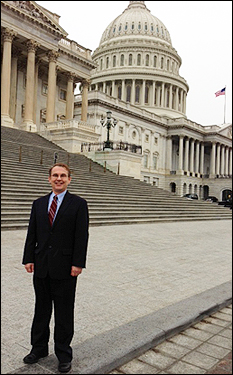While the nation buzzed in anticipation of the State of The Union address Feb. 12, engineering deans from across the country came to Washington D.C. for the annual American Society of Engineering Education public policy colloquium Feb. 12-13.

Vanderbilt University School of Engineering Dean Philippe Fauchet attended the conference, which focused on the most pressing federal policies impacting higher education and federally funded research, and later Fauchet met with staff members of Tennessee lawmakers.
While the top concern expressed by speakers and attendees alike at the conference related to the impending across-the-board-cuts scheduled to take effect in March, the need to strengthen the nation’s investment in the entire preschool through higher education (P-20) science-technology-engineering-math (STEM) pipeline and the importance of promoting advanced manufacturing were squarely in the center of the discussion.
The ASEE conference was held in advance of a federal advocacy day. On Wednesday, the deans met with members of their home-state delegations about federal policies that impact their schools.
Dean Fauchet, accompanied by Dean Wayne Davis of the University of Tennessee-Knoxville and Dean Joseph Rencis of Tennessee Tech University, spent the day meeting staff members from Sen. Lamar Alexander’s and Sen. Bob Corker’s offices, as well as staff in the offices of Reps. Jim Cooper, Diane Black and Chuck Fleischmann.
During these meetings, Dean Fauchet expressed his concerns regarding the pending budget cuts. These cuts would reduce federal funds by at least 5 percent beginning March 1 should Congress not pass a law to override them. Dean Fauchet highlighted the strong economic impact graduates with degrees in engineering have on nation’s local and national economy.
“It is not uncommon for spin-off companies like Neurotargeting or breakthrough technologies like Vanderbilt’s bionic leg to get their start at the university with the help of federal investments,” Fauchet said. “It is through these innovative companies and products we will be able to remain globally competitive for years to come.”
The congressional staff acknowledged the economic importance of engineering and a need for investment in federal research agencies like the National Science Foundation, the Department of Energy, the Department of Defense and the National Institutes of Health.
“While they agreed that indiscriminate budget cuts could be harmful to engineering research and education programs, it still seems unlikely that we will see a bipartisan agreement emerge to avoid these devastating cuts in advance of the March 1 deadline,” Fauchet said.
Vanderbilt Chancellor Nicholas S. Zeppos also spent Feb. 12 and 13 in the Capitol meeting with congressional leaders and making the case for federal investments in science and engineering research and education. He also advocated for reforms to Medicare that recognize the important role of academic medical centers in training future health care providers and caring for our region’s sickest patients, regardless of their ability to pay.
The visit follows a joint op-ed Zeppos wrote with University of Tennessee President Joe DiPietro in November urging Congress to avoid the across-the-board cuts that would “hinder long-term economic growth, security and prosperity.”
Read more: Zeppos urges Congress to prioritize research universities and academic medical centers